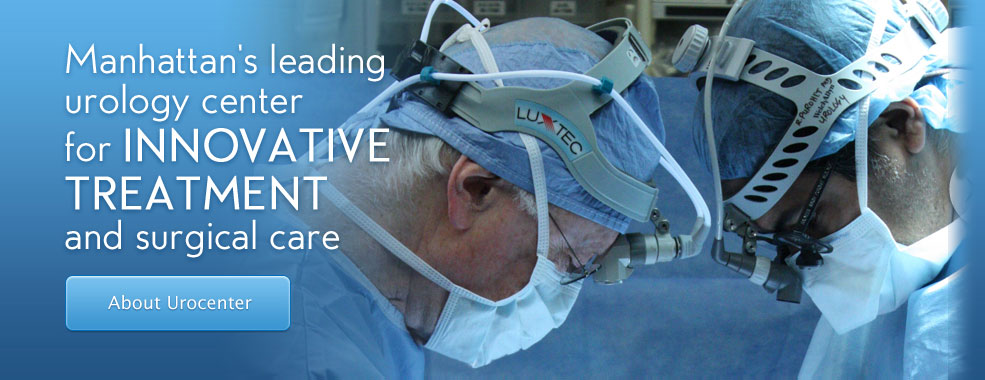Jerry G. Blaivas, MD, FACS
Dr. Blaivas is a world-renowned urological expert, surgeon, distinguished author, educator, and medical pioneer. He was one of the founders of urodynamics and established many of the current surgical procedures used to correct stress incontinence, urinary fistulas, urethral diverticulum, overactive bladder and neurogenic bladder.
He is also one of the few surgeons who routinely performs reconstructive surgery for prolapse and incontinence without the use of mesh. His success in this area has led him to publishing one of the largest series in the world on treatment of mesh complications.
Dr. Blaivas possesses decades of experience providing urology care to some of the most complex cases ever encountered, bringing academic and research-based modernization to the clinical forefront. His research in developing new medical techniques has become the standard in patient care, including breakthrough treatments and research in:
- Mesh complications
- Radiation complications
- Autologous Slings
- Natural Tissue Repairs
Dr. Blaivas was recently honored by the Canadian Journal of Urology as one of their Legends of Urology. Read the article >
Schedule an appointment online or call Dr. Blaivas today at (646) 205-3039 to schedule a confidential consultation.
Insurance Information
Dr. Blaivas does not participate with private insurance plans. He is considered an “Out of Network” physician, which means that payment in full is expected at the time of the visit and you will be reimbursed directly according to your insurance plan. As a courtesy, we offer to complete and mail claims on your behalf and assist you in obtaining timely reimbursement.
About the Uro Center of New York
At the Uro Center of New York, we combine clinical and academic excellence in a private practice setting. For over twenty years, our staff has been committed to diagnosing and treating people with bladder and prostate conditions. Our services include the use of state-of-the-art video urodynamic equipment and a custom-designed computer system that assists our physicians in ensuring an accurate and prompt diagnosis.





 Reduced testosterone levels are something that most men experience as they get a little bit older. However, when testosterone levels drop dramatically or go too low it can cause serious health problems for men. If you are noticing the symptoms of low testosterone then it is a very important to speak to a doctor or urologist to make sure that your testosterone is within safe parameters for someone like you, and also to make sure that it is not the result of a more serious health issue that you will need to address.
Reduced testosterone levels are something that most men experience as they get a little bit older. However, when testosterone levels drop dramatically or go too low it can cause serious health problems for men. If you are noticing the symptoms of low testosterone then it is a very important to speak to a doctor or urologist to make sure that your testosterone is within safe parameters for someone like you, and also to make sure that it is not the result of a more serious health issue that you will need to address. Another symptom associated with low testosterone is depleted motivation and depression. If you have been experiencing this as you have been getting older and are also experiencing the other symptoms associated with low testosterone, then it could be that a testosterone supplement would enable you to return to your normal frame of mind. However, there are a lot of causes of mental health problems and so it may not be the case that testosterone will be able to address all of your symptoms. It is vital to see a doctor, however, and get your hormones levels checked.
Another symptom associated with low testosterone is depleted motivation and depression. If you have been experiencing this as you have been getting older and are also experiencing the other symptoms associated with low testosterone, then it could be that a testosterone supplement would enable you to return to your normal frame of mind. However, there are a lot of causes of mental health problems and so it may not be the case that testosterone will be able to address all of your symptoms. It is vital to see a doctor, however, and get your hormones levels checked. Urinary tract infections are a very common thing. They can affect both men and women, though they are more common in women. Urinary tract infections are caused by bacteria entering the urinary tract through the urethra and can lead to problems with the bladder, kidneys, and other parts of the urinary system. If you suspect that you have a urinary tract infection, then you may be inclined to wait and see if it gets better by itself. Usually, bacterial infections do clear up on their own, however, it is a good idea to seek out medical assistance if you are having a problem of this nature.
Urinary tract infections are a very common thing. They can affect both men and women, though they are more common in women. Urinary tract infections are caused by bacteria entering the urinary tract through the urethra and can lead to problems with the bladder, kidneys, and other parts of the urinary system. If you suspect that you have a urinary tract infection, then you may be inclined to wait and see if it gets better by itself. Usually, bacterial infections do clear up on their own, however, it is a good idea to seek out medical assistance if you are having a problem of this nature. There are lots of things that can cause issues with urination. If you experience a burning sensation when you try to urinate, this is usually an indication of a problem with the urinary tract. Urinary tract infections are most often to blame, but there can also be things like urethral strictures that can cause the same sensation. Here we are going to look at what can cause a burning sensation when you try to pee and what you can do if you have these symptoms.
There are lots of things that can cause issues with urination. If you experience a burning sensation when you try to urinate, this is usually an indication of a problem with the urinary tract. Urinary tract infections are most often to blame, but there can also be things like urethral strictures that can cause the same sensation. Here we are going to look at what can cause a burning sensation when you try to pee and what you can do if you have these symptoms. This is caused by bacteria present in the urethra, bladder, and the urinary system as a whole that would not normally be there, causing some inflammation and pain. However, this is not the only reason why you may experience these symptoms. Pain and discomfort when urinating can also be a sign of other things, such as some types of cancer, prostate issues in men, and scarring or inflammation in the urethra caused by injury, surgery, or trauma. When it is the latter, this is usually deemed to be a urethral stricture, which is something that may need to be treated with surgery.
This is caused by bacteria present in the urethra, bladder, and the urinary system as a whole that would not normally be there, causing some inflammation and pain. However, this is not the only reason why you may experience these symptoms. Pain and discomfort when urinating can also be a sign of other things, such as some types of cancer, prostate issues in men, and scarring or inflammation in the urethra caused by injury, surgery, or trauma. When it is the latter, this is usually deemed to be a urethral stricture, which is something that may need to be treated with surgery. The first thing that you should do if you are experiencing problems when you pee is to see a doctor or a specialist urologist. If you have experienced some injury to your lower abdomen or have had some surgery that may have affected your urethral system, then it could be that you have something that will need further intervention. If you do not think that this is a likely cause, then it is most probable that you have an infection of some kind. However, since these symptoms can be related to something more serious such as certain types of cancer, it is very important to get a proper diagnosis. Urinary tract infections can be treated quite easily with antibiotics, but there could be something else at play that your doctor will need to investigate.
The first thing that you should do if you are experiencing problems when you pee is to see a doctor or a specialist urologist. If you have experienced some injury to your lower abdomen or have had some surgery that may have affected your urethral system, then it could be that you have something that will need further intervention. If you do not think that this is a likely cause, then it is most probable that you have an infection of some kind. However, since these symptoms can be related to something more serious such as certain types of cancer, it is very important to get a proper diagnosis. Urinary tract infections can be treated quite easily with antibiotics, but there could be something else at play that your doctor will need to investigate. Urologic Problems in Men
Urologic Problems in Men Urologic Problems in Women
Urologic Problems in Women